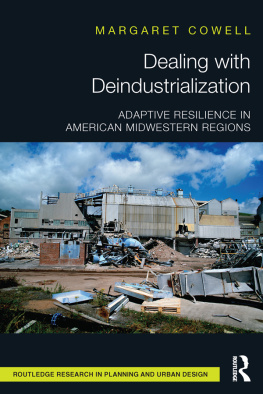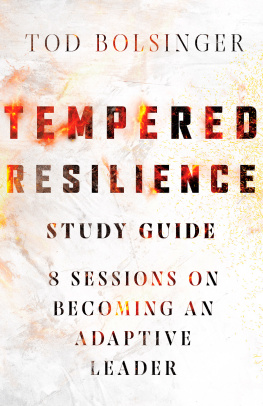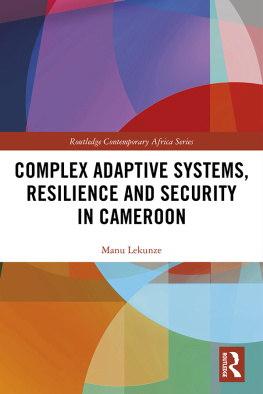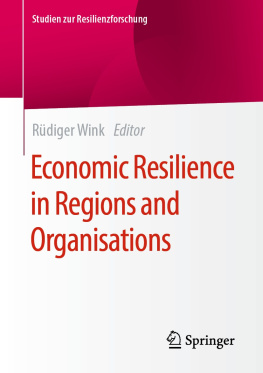Margaret Cowell - Dealing With Deindustrialization: Adaptive Resilience in American Midwestern Regions
Here you can read online Margaret Cowell - Dealing With Deindustrialization: Adaptive Resilience in American Midwestern Regions full text of the book (entire story) in english for free. Download pdf and epub, get meaning, cover and reviews about this ebook. year: 2014, publisher: Routledge, genre: Politics. Description of the work, (preface) as well as reviews are available. Best literature library LitArk.com created for fans of good reading and offers a wide selection of genres:
Romance novel
Science fiction
Adventure
Detective
Science
History
Home and family
Prose
Art
Politics
Computer
Non-fiction
Religion
Business
Children
Humor
Choose a favorite category and find really read worthwhile books. Enjoy immersion in the world of imagination, feel the emotions of the characters or learn something new for yourself, make an fascinating discovery.
- Book:Dealing With Deindustrialization: Adaptive Resilience in American Midwestern Regions
- Author:
- Publisher:Routledge
- Genre:
- Year:2014
- Rating:3 / 5
- Favourites:Add to favourites
- Your mark:
- 60
- 1
- 2
- 3
- 4
- 5
Dealing With Deindustrialization: Adaptive Resilience in American Midwestern Regions: summary, description and annotation
We offer to read an annotation, description, summary or preface (depends on what the author of the book "Dealing With Deindustrialization: Adaptive Resilience in American Midwestern Regions" wrote himself). If you haven't found the necessary information about the book — write in the comments, we will try to find it.
Margaret Cowell: author's other books
Who wrote Dealing With Deindustrialization: Adaptive Resilience in American Midwestern Regions? Find out the surname, the name of the author of the book and a list of all author's works by series.
Dealing With Deindustrialization: Adaptive Resilience in American Midwestern Regions — read online for free the complete book (whole text) full work
Below is the text of the book, divided by pages. System saving the place of the last page read, allows you to conveniently read the book "Dealing With Deindustrialization: Adaptive Resilience in American Midwestern Regions" online for free, without having to search again every time where you left off. Put a bookmark, and you can go to the page where you finished reading at any time.
Font size:
Interval:
Bookmark:
Alexander Gutzmer
Democracy and public space
Teresa Hoskyns
Mahyar Arefi
New challenges for architecture and planning
Chiara Tornaghi and Sabine Knierbein
Adaptive resilience in american midwestern regions
Margaret Cowell

by Routledge
2 Park Square, Milton Park, Abingdon, Oxon OX14 4RN
711 Third Avenue, New York, NY 10017
A catalogue record for this book is available from the British Library
Cowell, Margaret.
Dealing with deindustrialization: adaptive resilience in American
Midwestern regions/Margaret Cowell.
pages cm.(Routledge research in planning and urban design)
Includes bibliographical references and index.
1. Economic developmentMiddle West. 2. Deindustrialization
Middle West. 3. Middle WestEconomic conditions.
4. Middle WestEconomic Policy. I. Title.
HC107.A14C69 2014
338.0977dc23
2014013867
ISBN: 978-1-315-76270-8 (ebk)
by Swales and Willis Ltd, Exeter, Devon, UK
Font size:
Interval:
Bookmark:
Similar books «Dealing With Deindustrialization: Adaptive Resilience in American Midwestern Regions»
Look at similar books to Dealing With Deindustrialization: Adaptive Resilience in American Midwestern Regions. We have selected literature similar in name and meaning in the hope of providing readers with more options to find new, interesting, not yet read works.
Discussion, reviews of the book Dealing With Deindustrialization: Adaptive Resilience in American Midwestern Regions and just readers' own opinions. Leave your comments, write what you think about the work, its meaning or the main characters. Specify what exactly you liked and what you didn't like, and why you think so.











